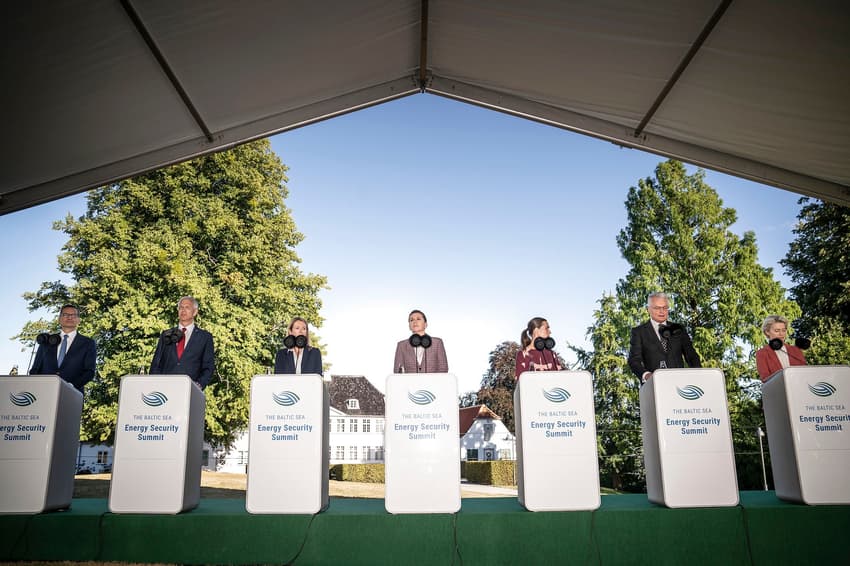Baltic nations confirm seven-fold offshore wind energy boost at Denmark summit

Nations bordering the Baltic Sea agreed on Tuesday to increase offshore wind energy to 20 gigawatts by 2030, as Europe
seeks to wean itself off Russian gas following Moscow's invasion of Ukraine.
"We have agreed to increase offshore wind in the Baltic Sea seven-fold by 2030," Danish Prime Minister Mette Frederiksen told reporters after hosting a meeting between Denmark, Estonia, Finland, Germany, Latvia, Lithuania, Poland and Sweden.
"We are the frontline of European energy security", Frederiksen said.
Russia was the only Baltic Sea nation not in attendance at Tuesday's meeting.
"In this war Putin is using energy as a weapon and has put Europe, as we all know, on the brink of an energy crisis with skyrocketing energy prices", Frederiksen said.
Twenty gigawatts would be enough to supply electricity to 20 million households, "more than the current wind offshore capacity in the whole of the EU today", she added.
By 2050, the Baltic Sea's wind energy capacity could be brought to 93 gigawatts, the countries said in a statement.
"Putin's attempt to blackmail us with fossil fuels is failing", European Commission President Ursula van der Leyen said.
"We're accelerating the green transition. We are getting rid of the dependency on Russian fossil fuels," she added.
The Commission said in March it wanted to reduce dependence on Russian gas by two-thirds this year, and completely by 2030.
It also unveiled a target to increase its share of renewable energy from 40 to 45 percent by 2030.
The EU also aims to reduce greenhouse gases by 55 percent by 2030 and to be carbon neutral by 2050.
On Monday, Denmark said it would increase its wind capacity off the Baltic Sea island of Bornholm from two to three gigawatts, and link this production to Germany's electricity grid.
In May, Germany, Denmark, the Netherlands and Belgium announced a similar agreement to increase the North Sea's wind power capacity tenfold to 150 gigawatts by 2050 to help the EU achieve climate goals and avoid Russian hydrocarbons.
Comments
See Also
"We have agreed to increase offshore wind in the Baltic Sea seven-fold by 2030," Danish Prime Minister Mette Frederiksen told reporters after hosting a meeting between Denmark, Estonia, Finland, Germany, Latvia, Lithuania, Poland and Sweden.
"We are the frontline of European energy security", Frederiksen said.
Russia was the only Baltic Sea nation not in attendance at Tuesday's meeting.
"In this war Putin is using energy as a weapon and has put Europe, as we all know, on the brink of an energy crisis with skyrocketing energy prices", Frederiksen said.
Twenty gigawatts would be enough to supply electricity to 20 million households, "more than the current wind offshore capacity in the whole of the EU today", she added.
By 2050, the Baltic Sea's wind energy capacity could be brought to 93 gigawatts, the countries said in a statement.
"Putin's attempt to blackmail us with fossil fuels is failing", European Commission President Ursula van der Leyen said.
"We're accelerating the green transition. We are getting rid of the dependency on Russian fossil fuels," she added.
The Commission said in March it wanted to reduce dependence on Russian gas by two-thirds this year, and completely by 2030.
It also unveiled a target to increase its share of renewable energy from 40 to 45 percent by 2030.
The EU also aims to reduce greenhouse gases by 55 percent by 2030 and to be carbon neutral by 2050.
On Monday, Denmark said it would increase its wind capacity off the Baltic Sea island of Bornholm from two to three gigawatts, and link this production to Germany's electricity grid.
In May, Germany, Denmark, the Netherlands and Belgium announced a similar agreement to increase the North Sea's wind power capacity tenfold to 150 gigawatts by 2050 to help the EU achieve climate goals and avoid Russian hydrocarbons.
Join the conversation in our comments section below. Share your own views and experience and if you have a question or suggestion for our journalists then email us at [email protected].
Please keep comments civil, constructive and on topic – and make sure to read our terms of use before getting involved.
Please log in here to leave a comment.